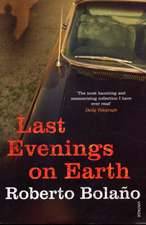
Father and son engage in aimless conversations that highlight their differing temperaments while the latter is haunted by a feeling of impending doom. The father wants to go out, have fun, while the son prefers more solitary outings and spends much of his time reading a book about surrealist poets and contemplating the fate of one particular poet, a minor writer who disappeared and was essentially forgotten by his peers. Their days pass in relative calm, though a strain can be felt in the relationship between the two. The title story follows a young man and his father on an ill fated holiday to Acapulco. In my reading, my favourites were the ones that happened to strike me as especially sad, but then I read this book at the bedside of a dying parent. That is not to imply though that there are not stories that stand out.

And it can also tend to contribute to blurring of the edges of many of the stories so that a reader may, at the end, be left with a sense of appreciating the journey but losing track of the details that set many of the tales apart. Yet there is an underlying ambivalence, anxiety, and insecurity that lends the collection an atmosphere that can be unnerving and faintly depressing. In this, my first encounter with Bolaño’s work, I found myself captivated by the misty melancholic mood, the affecting prose, and the characters, who are commonly struggling with the vagaries of what it means to be creative and to find value in life. The narrators or protagonists are unsure of their own memories, sometimes anxious and paranoid, sometimes bored and aloof–unwilling to trust, to fully engage with those around them. As a result, their existences carry a ghostly aura, they are haunted by an otherness that is indefinable to themselves and obscures their relationships with others.


Most are either exiles or products of the Chilean diaspora, loosely set down or wandering between Mexico or Europe.

Typically they are oddly groundless, restless beings who seem to drift through not only their own lives but through the lives of those they encounter. The individuals that populate the stories collected in Roberto Bolaño’s Last Evenings on Earth tend to be poets, writers, artists, and dreamers. The opening assertion is true, but that way lie ruin, madness, and death. A poet, on the other hand, can endure anything. But that’s not true: there are obviously limits to what a human being can endure. Which amounts to saying that a human being can endure anything.


 0 kommentar(er)
0 kommentar(er)
